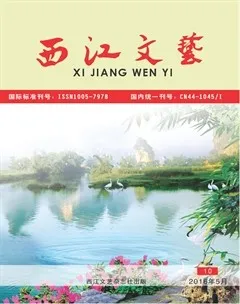Analysis on Foreign Publicity Translation: from the Perspective of national image
黄嘉琪
Part One Introduction
Giving an introduction of current and future developing tendency, the foreign publicity functions as a bridge between China and other countries through positively conveying information and spreading Chinas concept of peaceful development.
Part Two Overview on Foreign Publicity Translation
2.1 Foreign Publicity Translation
2.1.1 Purposes of Foreign Publicity Translation
Firstly, the foreign publicity translation aims at showing our country to the world in a comprehensive and real way. The translator is expected to make spare efforts to have a detailed research of all issues or questions concerned by western presses so as to exert more positive impact on international opinions as well as to get rid of the overdo, inappropriate, or distorted reports which often prior to domestic official report. Secondly, the foreign publicity translation should target to demonstrate new progress and development made by China, thus to show national image with prosperity, peace and harmony. Last but not least, the foreign publicity translation intends to improve Chinas speaking right towards global issues and to shape up national image. Improving the quality of foreign publicity translation stands for a breakthrough for the better national image and soft power. Being one of the purposes, national image closely relates to foreign publicity translation.
2.1.2 Principles of Foreign Publicity Translation
First, with the recognition of difference existing in the world, the translator should originate from information demand and thinking model of foreign receivers from the perspectives of custom and culture. Second, the foreign publicity translation is required to imply opinions or publicity intention in a report seemed as object, impartial and neutral so as to obtain trust from foreign readers and to comply with the publics usual practice of receiving news. Its translation is supposed to do well in hiding the conclusion in whole passage of report, finally lead to an equal conclusion made by receivers after logical analysis. Third, the foreign publicity translation should orient to discourse. Only when discourse is regarded as the basic translation unit can it be translated into the original styles carried with most important meaning through conveying of authors intention. With an overview of discourse, the translation version can be fluent enough by transforming language structure.
Part Three Translation Strategies from the Perspective of National Image
3.1 Supplement
Chinese, a language characterized by condensation and conciseness, more or less simplifies unnecessary messages. Supplying the complete and accurate information can greatly narrow the understanding gap between speaker and reader, thus to demonstrate our position and attitude, consequently to build up our national image.
3.2 Rewriting
On the premier of catching main idea and spirit, rewriting tends to be more flexible and richer including in changing in expression form, condensing the content, switching the view, shifting cultural intention, and so on.
3.3 Pragmatic Implication
Phrases are equipped with implication which is implicit and literary meaning which is explicit. It is much more suitable to express the implication of specific words during translation process. Combined with the context throughout the whole text, the translator should be careful of the selection of English phrases sharing similar meaning in Chinese.
3.4 Pragmatic Integration
Under the guidance of correct recognition, the translator can be freed from the original form, thus to reorganize them to make clear the information and pragmatic intention, finally to seek for the equivalence in pragmatic effect. Staging our spirit to the whole world, it can show our great efforts towards the construction and rejuvenation, as a result, it will give listeners an excellent impression on our national image.
3.5 Pragmatic Adaptation
As an activity for information exchange, application effect occupies a priority on language communication. The adoption of expression form, which follows up the target language, is favorable to expression of thought and implication in a more effective and accurate way.
參考文献:
Bielsa, Esperanca & Bassnett, Susan. 2010. Translation in Global News[M]. Shanghai Foreign Language Education Press.
Hatim, Bsail & Mason,Ian. 2001. Discourse and the Translator[M]. Shanghai: Shanghai Foreign Language Education Press.
蔡帼芬,2000,国际传播与对外宣传[M]。北京:北京广播学院出版社。
陈小慰,2007a, 外宣翻译中认同的建立[J]。《中国翻译》(1):60-65。
程镇球,2003,政治文章的翻译要讲政治[J]。《中国翻译》(3):18-22。
段连城,1990,呼吁:请译届同仁都来关心对外宣传[J]。《中国翻译》(5):2-10。
段鹏,2007, 国家形象建构中的传播策略[M]。北京:中国传媒大学出版社。
胡芳毅、贾文波,2010,外宣翻译: 意识形态操纵下的改写[J]。《上海翻译》(1):23-28。
朱义华,2012,从“争议岛屿”来看外宣翻译工作中的政治意识[J]。《中国翻译》(6):96-98。

